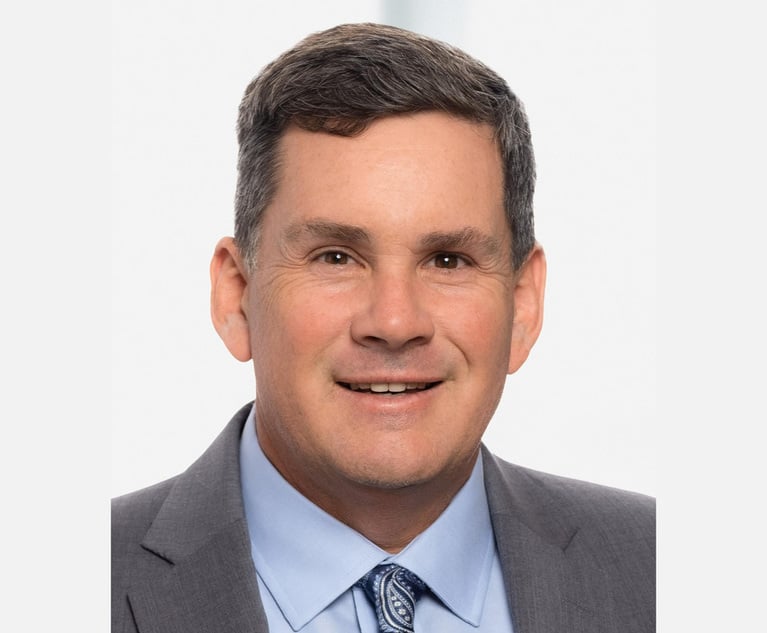A Tale of Two Derivative Suits: Issue Preclusion and Comity Prevail
The Delaware Supreme Court declined to adopt a new standard governing issue preclusion of derivative actions, creating a tension with Delaware courts' forceful encouragement that stockholders fully investigate their claims before pursuing such actions on behalf of a company.
February 07, 2018 at 09:23 AM
7 minute read

The Delaware Supreme Court declined to adopt a new standard governing issue preclusion of derivative actions, creating a tension with Delaware courts' forceful encouragement that stockholders fully investigate their claims before pursuing such actions on behalf of a company. On Jan. 25, the court issued its decision in California State Teachers Retirement System v. Alvarez fully dismissing a shareholder action against Walmart Inc. and its board and concluding years of deliberation at both the Delaware Court of Chancery and Supreme Court levels over whether a hastily pursued derivative suit should have a preclusive effect against more diligent plaintiffs.
Background
In early 2016, the Delaware Court of Chancery dismissed a derivative action involving Walmart on the ground that dispositive issues had already been litigated and resolved in the U.S. District Court for the Western District of Arkansas. The earlier Arkansas action was dismissed for failure to adequately plead demand futility—a prerequisite to bringing a derivative action without first requesting that a company's board of directors institute the action themselves. Because similar (though not identical) demand futility arguments were raised in the Delaware action, Chancellor Andre G. Bouchard determined that the dismissal of the Arkansas action was dispositive in the Delaware case on the basis of collateral estoppel, or issue preclusion.
Plaintiffs disputed the Chancery Court's mechanical application of the issue preclusion doctrine on a number of grounds. Most significantly, however, plaintiffs argued that the Arkansas action was only filed and resolved prior to the Delaware action because the Arkansas plaintiffs rushed their case while the Delaware plaintiffs performed a more thorough investigation, including by making a books and records request under Section 220 of the Delaware General Corporation Law. The Delaware plaintiffs argued such diligence—which was undertaken after heeding the blunt warnings from then-Chancellor Leo Strine to do so—should be credited rather than punished.
First Appeal and Partial Remand
On appeal in mid-2017, the Delaware Supreme Court declined to affirm or deny the Chancery Court's decision and instead remanded the case asking the Chancery Court to address whether the facts in that case implicated due process concerns for stockholders. On remand, Bouchard issued a supplemental opinion agreeing with the Delaware Supreme Court's statement that the facts presented “a troubling case.” Specifically, the chancellor noted the tension between two well-established and now competing principles: the encouragement that stockholders fully investigate their claims—including via books and records requests—before pursuing derivative actions, and the widely recognized principles of comity and judicial efficiency in recognizing the decisions of other courts that concern the same issues.
In an attempt to reconcile this tension, Bouchard recommended that the Delaware Supreme Court adopt a standard previously endorsed only in dicta that “a judgment cannot bind the corporation or other stockholders in a derivative action until the action has survived a Rule 23.1 motion to dismiss, or the board of directors has given the plaintiff authority to proceed by declining to oppose the suit.” However, recognizing that the Delaware Supreme Court would need to adopt such a standard before it could be applied, Bouchard conditionally reaffirmed that dismissal was appropriate and that plaintiffs' due process rights had not been violated.
Final Decision
After considering the supplemental opinion, the Delaware Supreme Court declined to adopt Bouchard's proposed new standard and affirmed dismissal of the Delaware action. Recognizing once again that “this dispute implicates complex questions of law and policy,” the Delaware Supreme Court ultimately held that “our state's interest in governing the internal affairs of Delaware corporations must yield to the 'stronger national interests that all state and federal courts have in respecting each other's judgments.'”
As suggested by the court's statement, much of its analysis was guided by its concern over giving full faith and credit to decisions of other courts. Like the Chancery Court, the Delaware Supreme Court determined that Arkansas—not Delaware—law governed the question of issue preclusion. Although the court noted an argument could be made that federal common law should govern the analysis, the court determined the two laws were similar enough that application of either would produce the same result.
Applying Arkansas law, the Delaware Supreme Court had little difficulty determining that most elements of issue preclusion were satisfied. Only two elements of Arkansas's issue-preclusion doctrine received significant discussion by the court: privity between the parties of the different cases, and adequacy of prior representation, which the court combined with its due process analysis.
On the privity requirement, the Delaware Supreme Court closely examined whether plaintiffs in the Arkansas action were so identified with the Delaware plaintiffs that they represented the same legal right. Although Arkansas law was silent on the issue, the court acknowledged the widely held rule that plaintiffs across derivative actions share an identity of interests because they both ultimately represent the sole owner of the claims asserted: the corporation. Plaintiffs argued, consistent with the standard proposed by Bouchard, that such shared interests exist only after a shareholder survives a motion to dismiss for failure to plead demand futility. It is only then that a shareholder could be said to be in pursuit of the corporation's interests. The Delaware Supreme Court was unpersuaded by this distinction, noting that at no stage of a derivative action does a shareholder represent any interest other than that of the corporation.
Moving to adequacy of representation and due process, the court collapsed the two questions into one, relying on United States Supreme Court precedent to determine that due process was only implicated to the extent the Arkansas plaintiffs were inadequate representatives of the Delaware plaintiffs. The Delaware Supreme Court held the Arkansas plaintiffs' representation was not so “grossly deficient” to violate due process, despite their “tactical error” in failing to perform a more thorough investigation and heed then-Chancellor Strine's warnings before pursuing their case.
Importance
As both the Delaware Chancery and Supreme Courts were acutely aware, the Delaware Supreme Court's decision in California State Teachers Retirement System v. Alvarez creates a tension with the practice of requiring a shareholder request a company's books and records before pursuing a derivative suit. Now more than ever, plaintiff shareholders will be tasked with balancing concerns over bringing derivative actions quickly versus bringing claims that will survive a motion to dismiss. For defendant directors, it may also mean having to simultaneously defend suits in multiple jurisdictions brought by different plaintiffs who believe they each have the better case.
However, concerns over the impact of the court's holding should be tempered based on the somewhat extraordinary facts presented in that case. In fact, the Arkansas action initially was stayed in favor of the Delaware action, in which the parties were awaiting the results of the Delaware plaintiffs' books and records request. However, as described by the Delaware Supreme Court, the books and records request in the Delaware action was “unusually contentious” and dragged on for nearly three years. During this delay, the Arkansas plaintiffs continued pursuing their case and the U.S. Court of Appeals for the Eighth Circuit eventually vacated the stay of the Arkansas action on the basis that a complete stay was inappropriate as some claims were brought in the Arkansas action but not the Delaware action.
Accordingly, absent similar exceptional circumstances, courts across jurisdictions are still likely to stay similar actions for the same well-established principles of comity and judicial efficiency underlying the Delaware Supreme Court's decision in California State Teachers Retirement System v. Alvarez.
Michelle Reed is a partner at Akin Gump Strauss Hauer & Feld. Her practice focuses on complex civil litigation matters, with an emphasis on securities and consumer class actions and internal investigations.
Matthew Lloyd, counsel at the firm, has a practice that involves a wide range of commercial litigation matters.
This content has been archived. It is available through our partners, LexisNexis® and Bloomberg Law.
To view this content, please continue to their sites.
Not a Lexis Subscriber?
Subscribe Now
Not a Bloomberg Law Subscriber?
Subscribe Now
NOT FOR REPRINT
© 2025 ALM Global, LLC, All Rights Reserved. Request academic re-use from www.copyright.com. All other uses, submit a request to [email protected]. For more information visit Asset & Logo Licensing.
You Might Like
View All

Labaton’s Eric Belfi on Running Case Investigation, Analysis and Delaware Presence

Chancery Stays Action Pending Resolution of a Motion to Dismiss in a First-Filed Action to Which the Defendant Is Not a Party
5 minute read
Chancery Court Exercises Discretion in Setting Bond in a Case Involving Share Transfer Restriction
6 minute readTrending Stories
- 1Trump's DOJ Files Lawsuit Seeking to Block $14B Tech Merger
- 2'No Retributive Actions,' Kash Patel Pledges if Confirmed to FBI
- 3Justice Department Sues to Block $14 Billion Juniper Buyout by Hewlett Packard Enterprise
- 4A Texas Lawyer Just Rose to the Trump Administration
- 5Hogan Lovells Hires White & Case Corporate and Finance Team in Italy
Who Got The Work
J. Brugh Lower of Gibbons has entered an appearance for industrial equipment supplier Devco Corporation in a pending trademark infringement lawsuit. The suit, accusing the defendant of selling knock-off Graco products, was filed Dec. 18 in New Jersey District Court by Rivkin Radler on behalf of Graco Inc. and Graco Minnesota. The case, assigned to U.S. District Judge Zahid N. Quraishi, is 3:24-cv-11294, Graco Inc. et al v. Devco Corporation.
Who Got The Work
Rebecca Maller-Stein and Kent A. Yalowitz of Arnold & Porter Kaye Scholer have entered their appearances for Hanaco Venture Capital and its executives, Lior Prosor and David Frankel, in a pending securities lawsuit. The action, filed on Dec. 24 in New York Southern District Court by Zell, Aron & Co. on behalf of Goldeneye Advisors, accuses the defendants of negligently and fraudulently managing the plaintiff's $1 million investment. The case, assigned to U.S. District Judge Vernon S. Broderick, is 1:24-cv-09918, Goldeneye Advisors, LLC v. Hanaco Venture Capital, Ltd. et al.
Who Got The Work
Attorneys from A&O Shearman has stepped in as defense counsel for Toronto-Dominion Bank and other defendants in a pending securities class action. The suit, filed Dec. 11 in New York Southern District Court by Bleichmar Fonti & Auld, accuses the defendants of concealing the bank's 'pervasive' deficiencies in regards to its compliance with the Bank Secrecy Act and the quality of its anti-money laundering controls. The case, assigned to U.S. District Judge Arun Subramanian, is 1:24-cv-09445, Gonzalez v. The Toronto-Dominion Bank et al.
Who Got The Work
Crown Castle International, a Pennsylvania company providing shared communications infrastructure, has turned to Luke D. Wolf of Gordon Rees Scully Mansukhani to fend off a pending breach-of-contract lawsuit. The court action, filed Nov. 25 in Michigan Eastern District Court by Hooper Hathaway PC on behalf of The Town Residences LLC, accuses Crown Castle of failing to transfer approximately $30,000 in utility payments from T-Mobile in breach of a roof-top lease and assignment agreement. The case, assigned to U.S. District Judge Susan K. Declercq, is 2:24-cv-13131, The Town Residences LLC v. T-Mobile US, Inc. et al.
Who Got The Work
Wilfred P. Coronato and Daniel M. Schwartz of McCarter & English have stepped in as defense counsel to Electrolux Home Products Inc. in a pending product liability lawsuit. The court action, filed Nov. 26 in New York Eastern District Court by Poulos Lopiccolo PC and Nagel Rice LLP on behalf of David Stern, alleges that the defendant's refrigerators’ drawers and shelving repeatedly break and fall apart within months after purchase. The case, assigned to U.S. District Judge Joan M. Azrack, is 2:24-cv-08204, Stern v. Electrolux Home Products, Inc.
Featured Firms
Law Offices of Gary Martin Hays & Associates, P.C.
(470) 294-1674
Law Offices of Mark E. Salomone
(857) 444-6468
Smith & Hassler
(713) 739-1250






